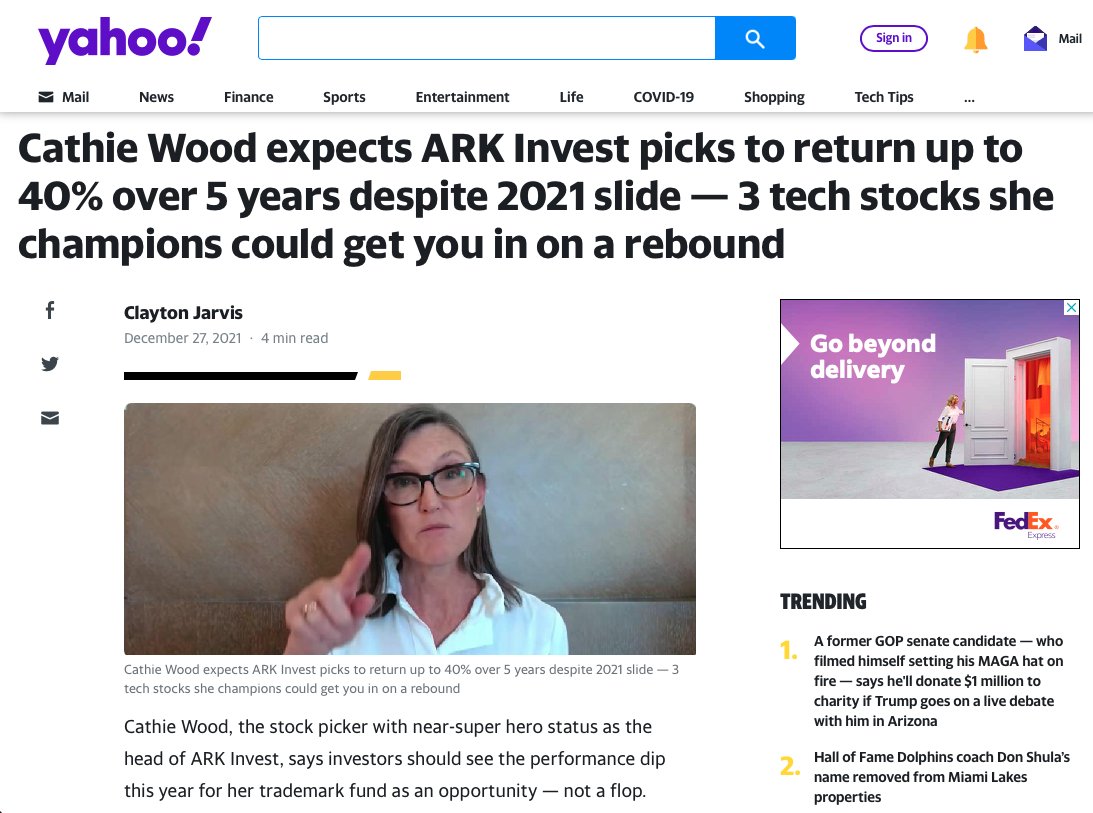
It's time for another 🧵about promoted tweets from @MasterworksIO.
You might recall we've talked about these things in the past, when the company was using made-up returns on actual paintings to promote its product.
https://twitter.com/felixsalmon/status/1389035348869754883
Now Masterworks is taking a new tack, which is to use other people's marks and likeness without their permission. 
https://twitter.com/sophiesishere/status/1478404297360646144

This ad features the @Yahoo logo (I'm sure without their permission) as well as the name and likeness of Cathie Wood (I'm sure without her permission).
The ad purports to be some kind of screenshot of an actual Yahoo article. But the headline on the article in question is this:
"Cathie Wood expects ARK Invest picks to return up to 40% over 5 years despite 2021 slide — 3 tech stocks she champions could get you in on a rebound"
"Cathie Wood expects ARK Invest picks to return up to 40% over 5 years despite 2021 slide — 3 tech stocks she champions could get you in on a rebound"
Here's a link to the article and an actual screenshot of what it looks like yahoo.com/now/cathie-woo… 

Here's the bottom of the article, which, if you chop it up enough and move enough things around, kindasorta has the wording (but not the photo) that Masterworks uses in its ad. Note that the words "dream investment" don't appear at all. 

The article seems to have been written by @ClayJarvis5; I'd love to know what he thinks of this ad, whether he thinks it fairly represents his piece, and whether anybody from Masterworks reached out to him before they ran it.
I'd also love to hear from @scottlynn @sophieishere @MichaelJWenner about why they think the best way to promote their billion-dollar company is to promulgate made-up Yahoo headlines while inviting lawsuits from both Yahoo and Cathie Wood.
It's also fascinating to me that this ad managed to circumvent Twitter's own brand-safety defenses. If I was Yahoo or Cathie Wood, I'd be upset at Masterworks, but I'd also be upset at Twitter for allowing Masterworks to run this ad.
Oh wow! Layers upon layers here: It turns out that the "Yahoo" article being quoted is in fact Masterworks SponCon. (Which, there's zero indication of that fact on the Yahoo site.)
https://twitter.com/ClayJarvis5/status/1479455314214899716
UPDATE: Yahoo has now taken down the article entirely. It also seems like Masterworks has tweaked its ad, while still keeping both the Yahoo logo and Cathie Wood’s name in there.
https://twitter.com/HobokenPudding/status/1479507110555758596
• • •
Missing some Tweet in this thread? You can try to
force a refresh




